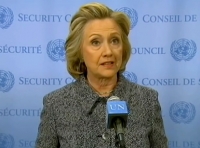The Hillary Clinton Email Saga: “Senior Intelligence Officials Said”

There’s a bigger story hidden inside the New York Times report that “a special intelligence review of two emails that Hillary Rodham Clinton received as secretary of state on her personal account — including one about North Korea’s nuclear weapons program — . . . contained highly classified information when Mrs. Clinton received them, senior intelligence officials said.” The review was undertaken by the Central Intelligence Agency and the National Geospatial-Intelligence Agency, which presumably originated the material. They concluded that the material had originally been given the U.S. government’s highest secrecy classification. Even if one of Clinton’s aides stripped the markings (a felony), Secretary Clinton surely knew satellite intelligence and North Korean nuclear deployments are the U.S. government’s most highly classified information.
The media correctly saw the news as political trouble for Hillary, but they missed two other crucial elements of the story. Somebody high up in the intelligence community leaked that story. And Hillary faces far more than political trouble. She’s being fitted for an orange jumpsuit.
The NYT story came from anonymous sources. For Camp Clinton, the most ominous words are “senior intelligence officials said.” They signal just how furious the intelligence community is at the gross mishandling of their crown jewels. Since the intelligence agencies must now sort through everything Hillary has given to the State Department, plus whatever the FBI can scrape from the server, you can expect the leaks to keep on coming. Worse yet for her, the spy agencies must conduct a full-scale damage assessment, based on the high likelihood her server was hacked by foreign governments (and perhaps some 17-year-old in his parents’ basement in Belgrade).
The intelligence services remember how seriously the Department of Justice dealt with former CIA directors John Deutsch and David Petraeus, who mishandled documents. They will demand equal treatment here. They will keep the heat on by leaking to the press. The Times story shows the faucet is already open.
Hillary’s legal problems stem from the “gross mishandling” of security information, which is a serious crime. It doesn’t matter whether the materials are stamped or not. It doesn’t matter whether you intended to violate the law or not. It is a violation simply to put them anywhere that lacks adequate safeguards. Like a private server. Nobody stamped Gen. Petraeus’ personal calendar, which he kept in an unlocked drawer at home. John Deutsch was just trying to catch up on work by taking his CIA laptop home. Those mistakes are trivial compared with what Clinton is already known to have stored on her private server in Chappaqua.
It’s just hand waving to keep saying the documents were not stamped. Satellite intelligence is always classified. So are private diplomatic discussions with foreign officials. They are born that way. Secretary Clinton is expected to know that, and she has said she was well aware of the classification rules. The straightforward conclusion is that she repeatedly violated laws for handling of national security materials.
As the investigation proceeds, Secretary Clinton should also be wondering how loyal her aides are. So far, they have marched in a solid phalanx with her. But whoever removed the classification markings on incoming satellite data faces years in jail. The FBI will be in a strong position to encourage them to speak “fully and frankly,” as they say in the State Department.
Valuable as the New York Times story is, it also misses a third crucial element. Although it highlights Hillary’s private email, it glosses over her private server. Reluctantly, she has begun to answer questions about the email account and even issued a limp apology. But she never mentions the server. When Fox’s Ed Henry asked her if she knew of any other government officials who had one, she refused to answer.
Why would a public official go to the time, trouble and expense of setting up a private server and paying her own IT people to run it? Simple: to keep the contents under her control even if the email account was discovered. She managed to keep the email account secret throughout her tenure at the State Department and for two years after that, avoiding legitimate Freedom of Information Act requests. When she was finally caught, she took full advantage of the extra layer of insulation her server provided. She reviewed her own records, turned over what she wanted, deleted everything else, and hunkered down. If her account had been at Gmail, Yahoo, or Hotmail, the federal judges overseeing the FOIA lawsuits would have ordered the Internet companies to turn over everything. The FBI could sort it out, and Hillary would have no way to delete the records. On the bright side, with a private server, she didn’t get a lot of pop-up ads for North Korean vacations.
The State Department is still doing its best to protect her, stonewalling and slow-walking requests for materials. To supervise the document releases, they hired Catherine Duval, who moved over from the IRS. Anybody who cannot find Lois Lerner’s emails has the right kind of experience for John Kerry. On Tuesday, Kerry announced he was beefing up his department’s FOIA office by naming Ambassador Janice Jacobs as “transparency coordinator.” Now, it looks like Jacobs just donated $2,700 to Hillary’s campaign. Was the State Department too dumb to even ask her about possible conflicts of interest?
The stonewalling won’t help. The reluctant apologies won’t help. The FBI investigation will keep grinding on, and the intelligence agencies will keep passing out any nuggets they find. If Hillary’s political troubles keep piling up, she won’t make it to the general election. If her legal troubles keep piling up, she’s going to wish the next president was Gerald Ford.

